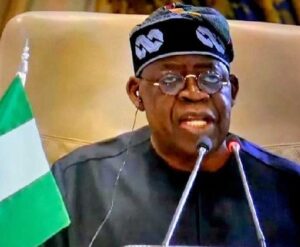Tinubu Calls for End to Gaza Conflict, Backs Two-State Solution at Riyadh Summit
Tinubu Calls for End to Gaza Conflict, Backs Two-State Solution at Riyadh Summit
Deji Elumoye in Abuja

Bola Ahmed Tinubu, FRN President
President Bola Ahmed Tinubu has called for an immediate cessation of Israeli military actions in Gaza, stressing that the prolonged conflict in Palestine has caused unbearable suffering for its people.
Speaking at the extraordinary Arab-Islamic Summit in Riyadh, Saudi Arabia, convened to address the ongoing crisis in the Middle East, Tinubu voiced deep concerns over the humanitarian situation in Gaza. The one-day summit, a follow-up to last year’s Riyadh gathering, brought together Heads of State from the Organisation of Islamic Cooperation (OIC) and the League of Arab States.
Reaffirming Nigeria’s position, Tinubu demanded an urgent ceasefire in Gaza and reiterated the country’s commitment to a two-state solution. He emphasized that this framework, where both Israelis and Palestinians can coexist peacefully, remains the most viable route to lasting peace in the region.
“The conflict in Palestine has lasted far too long, causing immense pain and loss of life,” the president stated. “As nations that uphold justice, dignity, and the sanctity of human life, we have a moral obligation to end this violence now.”
Tinubu criticized mere condemnations, urging a global effort to halt Israel’s aggression in Gaza. He added, “No political or military objective should come at the expense of innocent lives.”
The president also called on all parties involved to respect international laws and the rights of civilians. He remarked, “While self-defense is a right, it must be proportional and aligned with legal and moral standards. Civilians’ lives cannot be disregarded as collateral damage.”
Reiterating Nigeria’s unwavering support for a two-state solution, Tinubu explained that it reflects the rights of both Israelis and Palestinians to self-determination and peace. He described the solution as not just a diplomatic stance, but a vision based on equality and mutual recognition.
“Achieving this goal requires dialogue and understanding of the historical context,” Tinubu added. “This conflict did not start on October 7, 2023, and it cannot be resolved without principled compromise.”
The president highlighted the devastating impact of the conflict on global perception, noting how images of violence have spread rapidly across digital platforms. “We must explore new avenues for peace,” he urged.
Tinubu commended Saudi King Salman and Crown Prince Mohammed bin Salman for hosting the summit, calling it a crucial opportunity to reignite diplomatic efforts toward peace. He assured the assembly that Nigeria, given its own diverse experiences, would continue to support initiatives aimed at ensuring peace and stability in the Middle East.
“Nigeria’s history teaches us that identity politics must not overshadow the importance of understanding diversity,” he stated.
Emphasizing the need for open dialogue, Tinubu added, “Reconciliation may be challenging, but it is through sincere conversation that understanding can be fostered.”
The president also proposed the establishment of a secretariat to oversee the implementation of the summit’s resolutions, suggesting that a select group of leaders should be tasked with garnering global support and monitoring progress toward achieving permanent peace in the region.
During his opening remarks, Crown Prince Mohammed bin Salman condemned Israeli actions in Gaza and Lebanon, particularly the targeting of civilians and the violation of Al-Aqsa Mosque. He also criticized Israel’s decision to block UNRWA aid to Palestinians and highlighted the displacement of Lebanese citizens.
The Crown Prince reiterated Saudi Arabia’s support for a Palestinian state based on the 1967 borders and called for broader international recognition, urging more nations to join a global coalition alongside the EU and Norway.
Meanwhile, former presidential aspirant Chief Charles Udeogaranya expressed strong opposition to President Tinubu’s participation in the summit, arguing that it violated Nigeria’s constitution. Udeogaranya, who criticized Nigeria’s involvement in Arab and Islamic affairs, contended that the country’s secular status should preclude such engagement. He also described the president’s actions as a disregard for Nigeria’s identity as a predominantly Christian and non-Arab nation.
TRENDING SONGS
 Shock in Anambra: Bride Disappears Moments Before Wedding
Shock in Anambra: Bride Disappears Moments Before Wedding
 Nigerian Woman Returns ₦330 Million Accidentally Credited to Her Account
Nigerian Woman Returns ₦330 Million Accidentally Credited to Her Account
 APC Don Reach Morocco?’ VeryDarkMan Reacts to Seyi Tinubu Poster
APC Don Reach Morocco?’ VeryDarkMan Reacts to Seyi Tinubu Poster
 Bride Breaks Down in Tears as Wedding Meals Were Kept Secretly While Guests Go Home Hungry
Bride Breaks Down in Tears as Wedding Meals Were Kept Secretly While Guests Go Home Hungry
 Odogwu by Day, Robber by Night: How Marriage Joy Turned Into Tragedy
Odogwu by Day, Robber by Night: How Marriage Joy Turned Into Tragedy
 Nigerian Officials Allegedly Pocket N4–6B Weekly Through Smuggling Cartels at Seme–Badagry Border
Nigerian Officials Allegedly Pocket N4–6B Weekly Through Smuggling Cartels at Seme–Badagry Border
 Ahmad Yerima: Naval Officer to Face No Sanctions After Clash with Wike – Matawalle
Ahmad Yerima: Naval Officer to Face No Sanctions After Clash with Wike – Matawalle
 Trending Video: Muslim Man Joins Wife in Hallelujah Challenge ‘Dress Like Your Miracle’ Night
Trending Video: Muslim Man Joins Wife in Hallelujah Challenge ‘Dress Like Your Miracle’ Night
 Woman Seeks Advice as Late Brother’s Wife Refuses to Mourn Him Following His Death With Alleged Mistress
Woman Seeks Advice as Late Brother’s Wife Refuses to Mourn Him Following His Death With Alleged Mistress
 Nobody Cares About Fine Girls In The UK, I Miss Nigeria — Nigerian Lady Laments
Nobody Cares About Fine Girls In The UK, I Miss Nigeria — Nigerian Lady Laments
Share this post with your friends on ![]()













